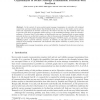Free Online Productivity Tools
i2Speak
i2Symbol
i2OCR
iTex2Img
iWeb2Print
iWeb2Shot
i2Type
iPdf2Split
iPdf2Merge
i2Bopomofo
i2Arabic
i2Style
i2Image
i2PDF
iLatex2Rtf
Sci2ools
106
Voted
ICITS
2009
2009
Cryptanalysis of Secure Message Transmission Protocols with Feedback
In the context of secure point-to-point message transmission in networks with minimal connectivity, previous studies showed that feedbacks from the receiver to the sender can be used to reduce the requirements of network connectivity. We observe that the way how feedbacks were used in previous work does not guarantee perfect privacy to the transmitted message, when the adversary performs a Guessing Attack. In this paper, we shall describe our new Guessing Attack to some existing protocols (in fact, we are the first to point out a flaw in the protocols of Desmedt-Wang's Eurocrypt'02 paper and of Patra-Shankar-Choudhary-Srinathan-Rangan's CANS'07 paper), and propose a scheme defending against a general adversary structure. In addition, we also show how to achieve almost perfectly secure message transmission with feedbacks when perfect reliability or perfect privacy is not strictly required.
Related Content
| Added | 19 Feb 2011 |
| Updated | 19 Feb 2011 |
| Type | Journal |
| Year | 2009 |
| Where | ICITS |
| Authors | Qiushi Yang, Yvo Desmedt |
Comments (0)

